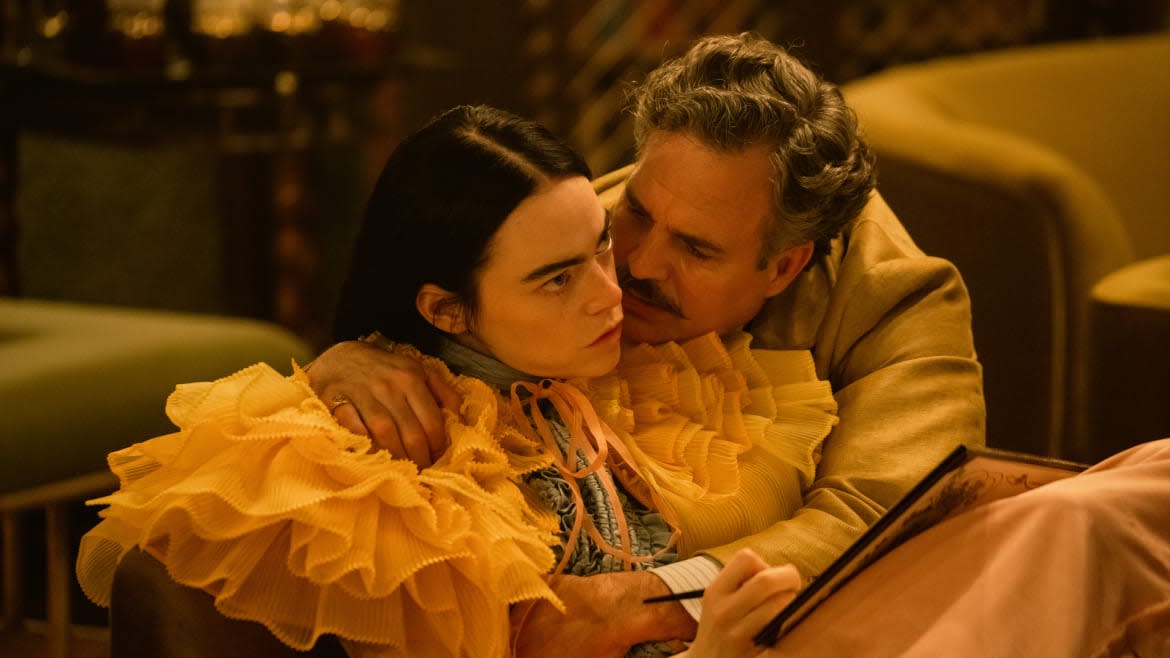‘Poor Things’: Emma Stone’s Wild Sexual Fantasia Is Now the Oscar Frontrunner

VENICE, Italy—Last year, David Cronenberg released a disquieting, oddly dislocated film that imagined a time to come when surgery and organ replacement have reached an advanced stage, becoming a type of performance art, even a sexual kink. Yorgos Lanthimos’s new film, which won the Golden Lion at the Venice Film Festival yesterday, shares some of those themes. But where Crimes of the Future was (no pun intended) heartless, cold and dry, dulling its shocks in order to unsettle us further, Poor Things is plush and baroque, disturbing its audience with a giddy verve. This makes for an often disconcertingly pleasurable spectacle, the most crowd-pleasing of Lanthimos’ career.
Emma Stone plays Bella Baxter, whose body has been repurposed after her death by suicide. She had been pregnant at the time of her death, leading an eccentric scientist named Godwin Baxter (Willem Dafoe) to replace her brain with that of her unborn baby, as an experiment. Bella therefore, when first we meet her, has the morphology of a woman but the faltering language, naivety and frankness of an infant. Stone’s gait expresses that disconnect: Though Bella’s muscles are at full maturity, her brain has only recently learned to move them, so she walks with a theatrical lurch, somewhere between a toddler’s waddle and the flounce of a marionette.
Indeed, Bella is a puppet of sorts, whose strings are pulled by Godwin—God, for short—and Poor Things depicts her just like a rag doll, in a series of delightfully frou-frou frocks with puffed sleeves a-go-go, in endless declensions of yellow.
Around Bella, the world itself is a doll’s house—and here again, Poor Things goes all out in the design stakes, producing theatrical (or perhaps operatic) sets that flaunt their unreality. Turbid skies over London in the film’s beginning are obviously painted; Lisbon is a fever-dream of Technicolor alleyways and looming façades; Alexandria seems perched on a clifftop at the end of the world, a cornucopia of steps and tilting turrets. Lanthimos fills this world with uncanny images—vessels drifting across the sky; a house-pet that is part duck, part dog; bubbles that Godwin belches out, which float and then pop above the dinner table. That vaguely steampunk aesthetic contributes to the film’s heightened artificiality, along with Lanthimos’s trademark fish-eye camerawork and a woozy, atonal score.

All of this is enormously inviting, as we follow Bella in her apprenticeship: This childwoman is eager to learn and develop, not least in terms of her nascent sexuality. Cue the arrival of Duncan Wedderburn, played with gusto by Mark Ruffalo as a ridiculous, devilishly sexy cad who spirits Bella away from Godwin and from her doe-eyed fiancé, Max (Ramy Youssef). Aboard a sprawling ocean liner, the pair indulge in their favorite pastime: namely, wild, demented banging.
Sex, which Bella calls “jumping furiously” is depicted with raucous abandon at this juncture of the film: Duncan, though he may be a conniving bastard, an idiot and a preening fop, is a gifted cocksman, and we know by now that Bella picks things up quickly. It takes a fairly serious command of tone to make a film at once so otherworldly, funny, and—well—horny, and Lanthimos and a remarkably game Stone are to be commended for their lack of shyness in that regard.
As the pair continue their adventure together, meeting various eccentrics along the way (a forthright socialite and her protégé on board the boat; an impish madame at a brothel in Paris), Bella grows tired of Duncan, and takes to prostituting herself, which she sees as educational and rewarding. As she progresses through the world, she learns about injustice and the cruelty of man: a necessary moral dimension but, one senses, one that doesn’t quite interest Lanthimos as much as putting on a show. Bella seems set to work out the mystery of her former life and confront God (!) about his experiment on her.
‘Drive My Car’ Director’s Latest Film Is Another Oscar-Worthy Triumph
There is so much opulence to drink in and marvel at in Poor Things, not least the aforementioned sets and costumes, with that striking leitmotiv of yellow—bilious smoke from the steamboat, a yolk-hued eiderdown with touchable brocade, and lemony dresses of satin and tulle, resplendent in a film whose cinematography is bathed in a similarly silky sheen. Performances are equally rich, from a wonderfully warm Dafoe to the scene-stealing Ruffalo, but it’s Stone who fully commits as Bella. Some may find the performance a little too rich in fact, with its Weisz-style elocution and permanently wide-eyed demeanor. Lanthimos’s characters have always displayed a strange detachment, particularly in their speech patterns, and that transpires here too. It makes sense in this story, but can occasionally grate.
Similarly, Poor Things’ sometime puerility may also be dictated by the subject matter—after all, Bella has the mind of a child—but on occasion that register hinders the film, as it’s leveraged for easy, smirking laughs. The fact that other characters are depicted in this way proves that this dimension does not only take its cue from Bella, and this becomes a fault. That comes out in language that lacks richness and wit. The film is consciously scabrous, combining high-flown verbiage and vintage cursing, but over time the recourse to swearing—and not particularly good swearing—feels juvenile. Because Poor Things’ story is existential, the unfortunate end result of this perspective—too often the film resorts to zingers and bons mots— is that it can feel glib. Poor Things’ conclusion, a touch too neat, a shade too pleased with itself, is of a piece with that glibness.

Nevertheless, Poor Things is a film of immense ambition and craft, and one that mostly does what it set out to do, which is to be a vast and riotous psychodrama, whose eccentricity should not impede its popular appeal. Lanthimos’ eye, as a director, is better than ever before, particularly in the striking compositions he pulls together. Few will argue with it winning the Golden Lion—I am among those few—and it is surely destined for great success. Right now, like its eager heroine, it is taking its first steps out into the big, wide world.
Liked this review? Sign up to get our weekly See Skip newsletter every Tuesday and find out what new shows and movies are worth watching, and which aren’t.
Get the Daily Beast's biggest scoops and scandals delivered right to your inbox. Sign up now.
Stay informed and gain unlimited access to the Daily Beast's unmatched reporting. Subscribe now.

 Yahoo News
Yahoo News 
